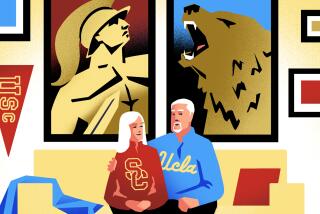Given direction, Oregon’s Jordan Bell finds way to the Final Four
- Share via
A mother in Long Beach digs through some boxes, detritus from a scrap book way behind schedule. She produces a piece of paper.
It has about 500 words, black ink, Arial font. It begins: “My name is Jordan Bell.”
Then: “Although I might seem like a person who has everything …”
Bell wrote it before he became the key contributor to Oregon’s Final Four run. There were some misspellings, and the writing wandered a bit, but the theme was clear:
Sometimes all it takes to change a life is a person who cares.
With more time, Bell might have smoothed out the ending, made it less abrupt. He might have written something about a last-minute flight to the Midwest, and a promise kept.
Bell tried to explain last week shortly after the Ducks upset top-seeded Kansas and cut down the nets in Kansas City.
“A lot of people don’t know,” he said, “I got kicked out of my high school.”
“Yeah,” he smiled, “I was bad.”
It made sense that the first time Bell met Sharrief Metoyer, Bell ended up running. There would be a lot more of that.
Bell was at a basketball camp run by Metoyer, who was then the coach at Long Beach Poly High. Bell got mouthy. Metoyer kicked him out of the gym and sentenced him to a mile on the track.
Bell, the youngest of Carolyn Gray’s five children, was used to being punished. His father was intelligent and popular, the president of his high school class who had gone off to the military and come back addicted to drugs. The poison seeped down a generation. Bell resented his father. He felt ignored, unloved, and he quietly seethed.
“Just mad at the world,” Bell said.
Bell was 11 when he decided for the first time to get expelled from his middle school. He was successful.
At Poly, he thought he’d be a football player, but as a freshman his phone and wallet were stolen from his locker. Someone told Bell that a teammate was the thief. Bell raged. One day, the teammate left his own wallet unguarded on the team bus. Bell found it, took the money and gift cards, got caught and was kicked off the team.
“I asked him why was he trying to be so hard or so mean?” his mother recalled. “His answer was, ‘Well, being good didn’t get me anywhere.’”
He wasn’t dumb. But without football, he wrote later, “I didn’t really have a reason to keep my grades up.” He was popular with classmates, but with grades no longer a worry he had no reason to listen to his teachers. Eventually, they had enough.
Bell wasn’t kicked out of Poly completely. He was removed from classes and put in a program for students with behavioral issues called P.M. ACES. It started each day at 2 p.m. in an annex behind the main building.
I asked him why was he trying to be so hard or so mean? His answer was, ‘Well, being good didn’t get me anywhere.’
— Carolyn Gray, Jordan Bell’s mother
The program “allowed time to let these kids grow up,” said Payton Lonon III, one of Bell’s instructors.
It also allowed time for Bell to start playing basketball at a local park. Word got back to Metoyer that Bell wanted to play for a team — and that he’d had a growth spurt.
Bell wasn’t a great prospect, but something about him drew Metoyer’s interest. Bell was considering transferring to another school, but Metoyer persuaded him to stay.
“He wasn’t misguided,” Metoyer said. “I just think he was unguided. There’s a difference.”
Metoyer asked Lonon to keep an eye on Bell. When Bell became eligible athletically, Metoyer asked for clearance from Poly’s principal.
Then he met with Bell and Gray and set up rules. First, Bell would have to wear a tie and sweater to school each game day, like his teammates. He’d have to keep his grades high. And he’d have to be on time for every class, every practice, every day. The rules were non-negotiable. Agree or don’t play.
Poly, at the time, had one of the best programs in California. Bell wasn’t a starter, but basketball, Metoyer saw, was giving him “a glimpse of hope.”
Still, Bell’s sophomore year wasn’t much better than his freshman year. A teacher would catch him with his phone out in class, and the entire team would run. Bell would be late to practice, and the entire team would run. He’d talk back, they’d run. His junior year was a little better. The team still ran, a lot, but at least afterward Bell would be remorseful.

He makes three-pointer for 53-50 win
Tardiness remained an issue. By Bell’s junior year, on days Gray had to leave early for work, Metoyer would pick up Bell for school.
Bell’s behavior improved. He wanted to go to college, like Gray had. His basketball progress was even more rapid. Anyone could see he was a natural shot blocker, a skill Metoyer couldn’t take credit for.
“That came from, actually, ‘Guitar Hero’,” Bell said. “No, seriously.” He explained that the skill is all about timing, a good lesson for an inside player with below-average length and height.
His senior year was his best yet. Bell committed to Oregon, and when he did, Gray recalls telling a Ducks assistant that they were going to be a winner.
She was right. The Ducks reached an NCAA regional final in Anaheim a year ago. Metoyer, who’d by then quit as Poly’s coach after a dispute with the California Interscholastic Federation, couldn’t make the game. Poly was playing for a state championship, and he felt he had to go. But he vowed he’d be there for Bell if there was a next time, wherever the game was.
Last week, Bell blocked eight shots against Kansas to help the Ducks win the Midwest Regional. Metoyer, scrambling to get on a late flight, arrived just hours before the game started. Before he cut down the net, Bell climbed into the stands to find Metoyer.
Only someone familiar with Bell’s Oregon admissions essay would know how special his former coach’s presence would be.
He had written about Metoyer: “That father figure in my life that I so desperately needed.”
Follow Zach Helfand on Twitter @zhelfand
More to Read
Go beyond the scoreboard
Get the latest on L.A.'s teams in the daily Sports Report newsletter.
You may occasionally receive promotional content from the Los Angeles Times.











